冀教版英语七年级下册《A Dinner Date》After-School Activities 教
最新冀教版七年级英语下册Lesson19ADinnerDate优质课件

【活学活用】
—Which of the two books is more interesting?
—Sorry, I haven’t read them. You can buy ________ of them
if you like.
A. all
B. any C. some
D. both
பைடு நூலகம்
How about coming over for dinner this evening? 今晚过来吃晚饭怎么样? 【自主领悟】How about. . . ? 意为“……怎么样(好不好)?” 常 用 来 征 求 对 方 的 意 见 或 询 问 有 关 情 况 , 相 当 于 What about. . . ? about为介词,其后接名词、代词或动名词。
(2)would like to do sth. =want to do sth. 意为“想要做某事”。 例如: I would like to buy some books. =I want to buy some books. 我想买些书。
【归纳拓展】would like的用法 (1)would like sth. =want sth. 想要某物 例如:Would you like some milk? 你想喝些牛奶吗? (2)would like sb. to do sth. 想要某人做某事 (3)Would you like sth. 的肯定答语常用Yes, please. /OK. /All right. 等; 其否定答语常用No, thanks. Would you like to do. . . 的肯定答语常用Yes/Sure, I’d like/love to. ; 其否定答语常用Sorry, I can’t. /I’d like/love to, but. . . 。
冀教版七年级英语下册lesson19:A Dinner Date

He is going to clean the floor this weekend.
What are/is …going to do this … (evening/ Thursday/ Frida weekend)?
He is going to watch TV this Sunday. dance He is going to dance this Saturday.
What does she often do after school?
do some reading visit grandparents
What does he often do after school?
study for a test
go to the mountain
What does she often do after school?
What are they going to do this weekend? have a school trip They are going to have a school trip this weekend.
have a big dinner They are going to have a big dinner this weekend.
be going to
1)What are you going to do this weekend? I’m going to the countryside with my dad. We are going to plant trees. What are you going to do this evening? I’m going to the chess club after school. be going to 表示主语将要进行某一行动的打算、 意图。这种打算常经过预先考虑并含有自己做好 某些准备的意思,因此用be going to表示的行动 通常会付诸实践。后面要接动词原形。 take part in 参加) the long jump. She is going to ____________(
冀教版英语七年级下册 Unit 4 Lesson 19《A dinner date》课件(共18张)

at school
at home in the office
do homework
7:30---9:00
at home
Saturday
play chess
in the afternoon
in the club's room
Make a to-do list for this weekend, talk it with your partner. Task A: Make a dialogue Task B: write a report
listen to music
watห้องสมุดไป่ตู้h TV
play soccer
A:What are you going to do after school? B: I am going to ... ., what about you? A: I'm going to...
What is she going to do after school?
do some reading visit grandparents
be going to .....
am is
are
What is she going to do after school? She is going to do some reading after school. She isn't going to do some reading after school. Is she going to do some reading after school?
Unit 4 After-School Activities
Lesson 19 A Dinner Date
冀教初中英语七年级下册《Lesson 19 A Dinner Date教案 (2)
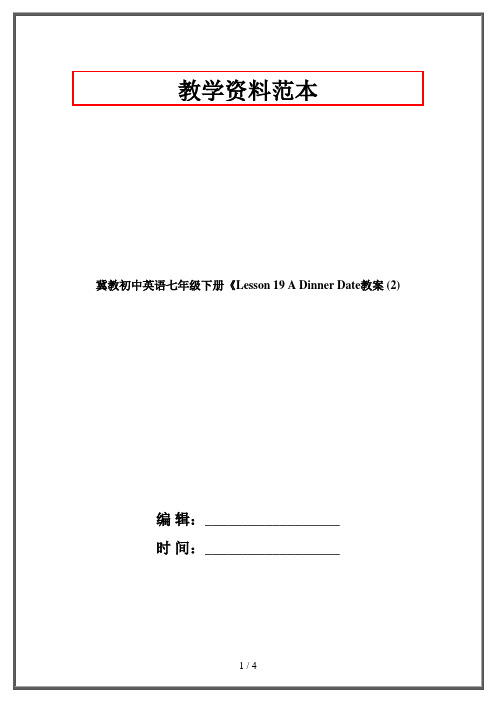
Unit 4 After-School Activities Lesson 19 A Dinner Date Teaching Analysis1. Teaching Aims●Knowledge Section:(1)Master the following words:activity, volleyball, practice, chess, club, both, nothing(2)●Skill SectionContinue to build up the ability in listening, speaking, reading, writing and translating, especially enable the students to make sentences in English about their plans.●Affect SectionGet students to know how to express their plan correctly.2.Teaching FocusVocabulary and patterns in this lesson3. Difficult pointsbe going toTeaching AidsMultimedia, radio-tapeTeaching ProceduresStep I Class Opening (5 minutes)1. GreetingT: Good morning, class! How are you today?Ss: Good morning, Miss An! Fine, thank you. And you?T: I’m fine, too.2. Free TalkT: What’s the date today?S1:It’s April 7th.T: What day is it today?S2: It’s Monday.T: Look out of the window. What’s the weather like today?S3: It’s sunny.[设计思路:使用亲切、贴近生活的问候语言拉近师生关系,带学生自然进入英语氛围。
冀教版英语七年级下册Unit 4:Lesson 19 A Dinner Date. 教案设计

Unit 4 After-school activities 教案Lesson19 A Dinner DateTeaching aims(教学目标):1. 牢记本课黑体词汇:activity/volleyball/practice/chess/club/both/nothing等;2. 熟读对话,把握其意;3. 背诵重点句子1-7,并灵活运用相关知识点。
Teaching procedures(教学过程):Step1:导入Did you invite someone for dinner? How can you invite someone for dinner? Today let’s learn Jim how to invite Steven for dinner.Step 2:自主学习任务一:限时5分钟,熟读所有词汇,牢记黑体词汇任务二:熟读对话,把握其意,画出不理解处,同桌之间交流任务三:背诵重点句子,并自学知识点,画出不理解处,同桌之间交流1. What day is it today?2. Would you like to come over for dinner today?3. I have volleyball practice tomorrow.4. How about Wednesday?5. I usually volunteer at Old Age Home on Thursdays.6. We’re both busy all week.7. Nothing!Step 3:师生互动互动一:单词记忆比赛互动二:对话熟读接力赛互动三:知识点展示大比拼知识点一:What day is it today?【固定句型】询问星期几:“What day is it today?”或“What day is today?”答语:“It is …today. ”或“Today is …”Eg: —What day is it today?—It's Monday.—What day is today?—Today is Sunday.注意:星期的名称是专有名词,第一个字母必须大写。
冀教版英语七年级下册 Unit 4 Lesson 19《A dinner date》课件(共27张PPT)
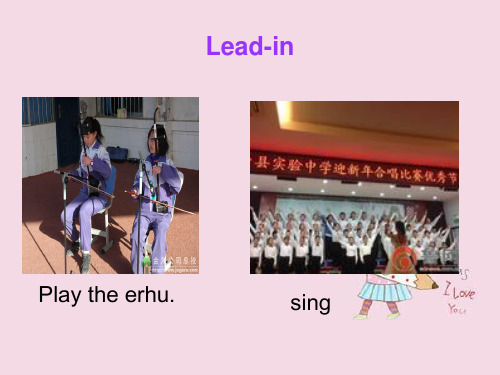
Read the lesson carefully and finish the exercise
• 1. Jim is going to the countryside with his family.(T or F) • 2. Will Steven come over for dinner on Monday evening? • 3. What is Jim going to do on Wednesday? • 4. I usually volunteer at the Old Age Home on Thursdays. • (翻译句子)
do well in =be good at 在.....做的好
• 5 这个周末你打算做什么? 我打算种树。 What are you going to do this weekend? We are going to plant trees.
动词原形 ,意为“将要,打算 be going to + _______ 做.....”.
volunteer
play chess
play volleyball
bingo
新词速记:
activity /æk'tɪvɪti/ Steven /sti:vn/ volleyball /'vɒlɪbɔ:l/ practice /'præktɪs/ chess /tʃes/ club /klʌb/ volunteer /vɒlən'tɪə(r)/ bingo /'bɪŋgəu/ both /bəuθ/ nothing /'nʌθɪŋ/
2024七年级英语下册Unit4Lesson19ADinnerDate课件新版冀教版
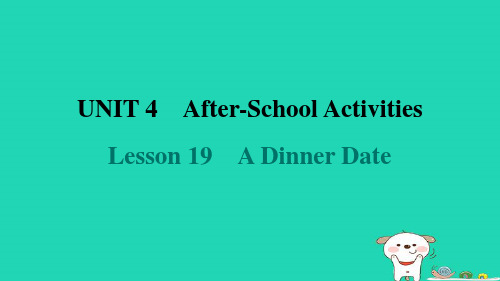
Ⅰ
Ⅱ
Ⅲ
Ⅳ
4. He listened carefully, but he heard nothing . 5. I need to practice more to be better at volleyball (排球).
Ⅰ
Ⅱ
Ⅲ
Ⅳ
They will have dinner next week.
Ⅰ
Ⅱ
Ⅲ
Ⅳ
C. are; going to do
D. do; do
Ⅰ
Ⅱ
Ⅲ
Ⅳ
( D )13. How about A. go C. to go
out for a walk? B. went D. going
Ⅰ
Ⅱ
Ⅲ
Ⅳ
( C )14.A smile costs(花费) so always keep smiling!
A. usually
B. never
C. sometimes
D. once
Ⅰ
Ⅱ
Ⅲ
Ⅳ
Ⅳ. 词语运用 Today 16. is (be) Monday. Jim invites Steve to come
over for dinner, 17. but Steve is busy this week. On Wednesday, he is 18. going (go) to the chess club. He usually 19. volunteers (volunteer) at the Old Age Home on Thursdays.
冀教版英语七年级下册UNIT 4 Lesson 19 A Dinner Date 教案
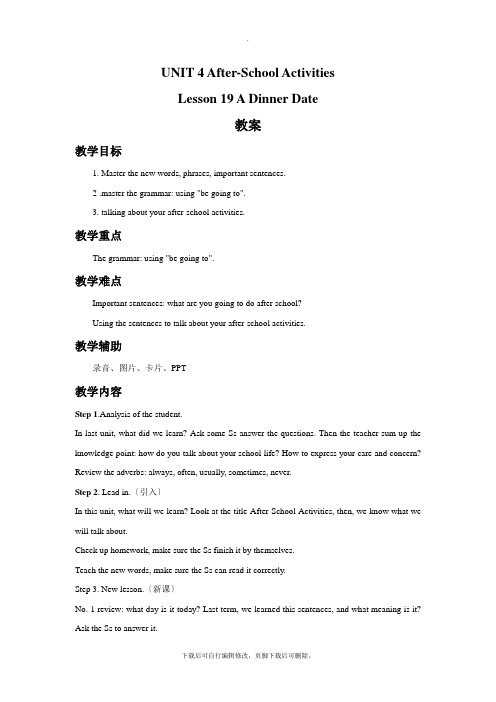
UNIT 4 After-School ActivitiesLesson 19 A Dinner Date教案教学目标1. Master the new words, phrases, important sentences.2 .master the grammar: using "be going to".3. talking about your after-school activities.教学重点The grammar: using "be going to".教学难点Important sentences: what are you going to do after school?Using the sentences to talk about your after-school activities.教学辅助录音、图片、卡片、PPT教学内容Step 1.Analysis of the student.In last unit, what did we learn? Ask some Ss answer the questions. Then the teacher sum up the knowledge point: how do you talk about your school life? How to express your care and concern? Review the adverbs: always, often, usually, sometimes, never.Step 2. Lead in.〔引入〕In this unit, what will we learn? Look at the title-After-School Activities, then, we know what we will talk about.Check up homework, make sure the Ss finish it by themselves.Teach the new words, make sure the Ss can read it correctly.Step 3. New lesson.〔新课〕No. 1 review: what day is it today? Last term, we learned this sentences, and what meaning is it? Ask the Ss to answer it.No. 2 explain the text:First, we look the picture at the top of the page, who is this? And what are they doing? Second, we look the picture at the middle of the page, It is Steven's calendar, what will he do in the calendar?Third, we look the picture at the bottom of the page, It is Jim's calendar, what will he do in the calendar?At last, we learn the passage, explain the passage in Chinese.grammar: using "be going to". Review the "will".Example: 1. we are going to have a party tomorrow.I am going to be a volleyball player in the future.She is going to visit her grandma next week.He will see a movie with his friends this afternoon.Step 4. Play the tape for the Ss to follow.Make the Ss listen the text, then let them read follow the tape.Step 5.Summary. 〔小结〕Sum up the text what we learned, and the new words and phrases.HomeworkFinish the activity book and the practice.Copy the new words twice.。
冀教版英语七年级下册Unit 4:Lesson 19 A Dinner Date. 教案 (2)

Unit4 After-School ActivitiesLesson 19: A Dinner Date一、教材分析本节课是冀教版七年级下册英语第四单元第19课。
话题是Talk about weekend activities and personal interests,语法是be going to 的用法。
本单元的话题是课外活动,非常贴近学生的生活,学生通过学习与课外活动相关的短语和be going to句型表达一般将来时的用法,能够结合自己实际情况,.谈论自己关于周末活动的计划和打算。
让学生在合作交流中参与活动,体验语言功能带来的收获。
本节课是本单元的第一节,提供了词汇和句型,使学生在谈论课外活动的同时,学会一些生词和短语,掌握be going to的用法,了解中外课余活动的差异。
我充分利用教材贴近学生生活的特点,在课堂上对学生进行英语听、说、读、写的训练,全面提高学生对语言的综合运用能力,并且渗透了学生对课余生活合理安排的情感教育,促进学生心智发育。
学好本节课,使学生初步掌握课余活动的一些短语、 be going to的用法,能用所学英语知识谈论自己的兴趣和爱好,为以后的学习打下扎实基础。
二、学习者特征分析1、七年级学生的心理特征和认知发展水平:七年级学生喜欢直观、形象的教学活动,他们有较高的求知、表现欲,对课余活动的话题感兴趣,他们注意力集中时间短,但已具备一定的语言沉淀,形成一定的学习策略。
因此,我设计的课堂活动更多的考虑了学生在已有知识体系上的建构和语言生成,让人人都能参与,增强他们学习英语的积极性和自信心。
2、七年级学生的英语语言知识和技能水平:他们通过小学和初中第一学期的学习,已经积累了一定的词汇量,能用英语表达一些课余活动的词汇,能使用简单的语言表达自己的想法,他们已经拥有简单听说读写能力。
本节课生词不多,短语贴近生活,易于记忆,因此学生在词汇学习过程中没有太大困难,主要难点是be going to的用法。
英语七年级冀教版下册 Lesson 19 A Dinner Date 教案
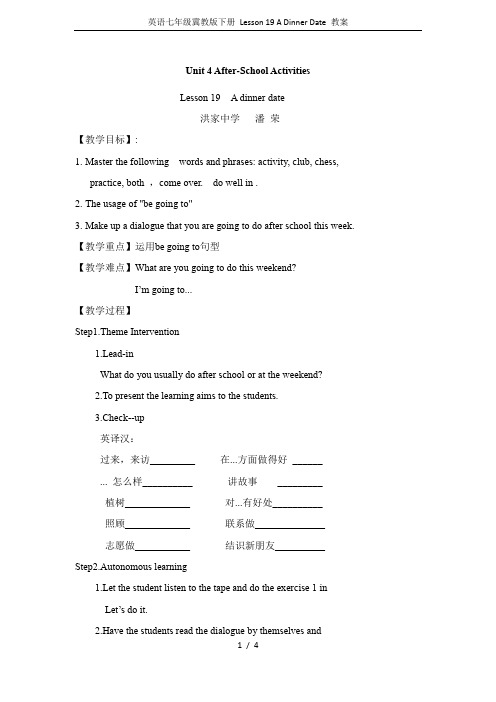
Unit 4 After-School ActivitiesLesson 19 A dinner date洪家中学潘荣【教学目标】:1.Master the following words and phrases: activity, club, chess,practice, both ,come over. do well in .2.The usage of "be going to"3.Make up a dialogue that you are going to do after school this week. 【教学重点】运用be going to句型【教学难点】What are you going to do this weekend?I’m going to...【教学过程】Step1.Theme Intervention1.Lead-inWhat do you usually do after school or at the weekend?2.To present the learning aims to the students.3.Check--up英译汉:过来,来访_________ 在...方面做得好______... 怎么样__________ 讲故事_________植树_____________ 对...有好处__________照顾_____________ 联系做______________志愿做___________ 结识新朋友__________Step2.Autonomous learning1.Let the student listen to the tape and do the exercise 1 inLet’s do it.2.Have the students read the dialogue by themselves andthen Do the exercise 2 in let’s do it.3. The teacher explains the key sentences to the students.Step3.cooperation and exchangeLet the student have a discussion in their own groups.1.I’m not doing well in math this ye ar.词组“do well in ...”意为“在……方面做的好;擅长于…”,in之后接名词、动名词或代词。
冀教版英语七年级下册Unit 4:Lesson 19 A Dinner Date. 教案 (1)
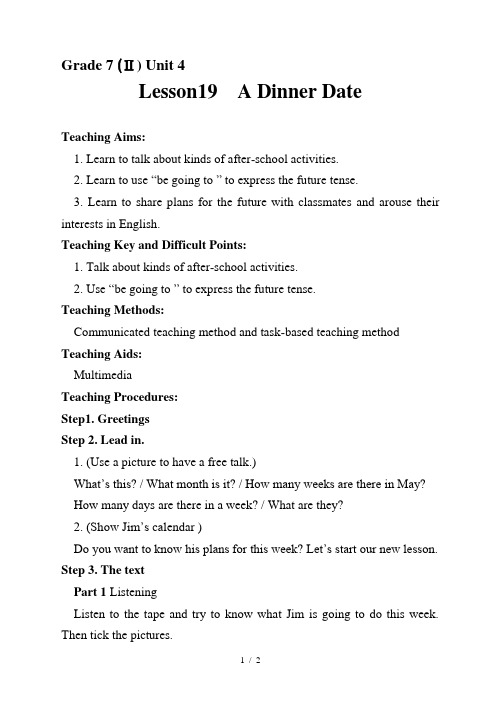
Grade 7 (Ⅱ) Unit 4Lesson19 A Dinner DateTeaching Aims:1. Learn to talk about kinds of after-school activities.2. Learn to use “be going to ” to express the future tense.3. Learn to share plans for the future with classmates and arouse their interests in English.Teaching Key and Difficult Points:1. Talk about kinds of after-school activities.2. Use “be going to ” to express the future tense.Teaching Methods:Communicated teaching method and task-based teaching method Teaching Aids:MultimediaTeaching Procedures:Step1. GreetingsStep 2. Lead in.1. (Use a picture to have a free talk.)What’s this? / What month is it? / How many weeks are there in May? How many days are there in a week? / What are they?2. (Show Jim’s cal endar )Do you want to know his plans for this week? Let’s start our new lesson. Step 3. The textPart 1 ListeningListen to the tape and try to know what Jim is going to do this week. Then tick the pictures.Part 2 ReadingRead the dialogue by yourself as quickly as possible and write down Steven’s Schedule for the week.Part 3 Role-playAsk the students to role play the dialogue and show in front of the class. Step 4. Knowledge transferenceActivity 1 Work in pairs. Discuss their own plans.Eg. A: What are you going to do on...according to the card?B: I'm going to …A: Are you going to … on...?B: Yes, I am./ No, I'm not. What are you going to do on...?A: I am going to …Activity 2 Work in groups.Try to make a poster about plans for the next week for your group. Step 5. SummarySummarize how to use be-going-to-do and do Ex.3 in Let’s do it.Step 6. Homework1. Improve your poster.2. Write three sentences to describe you yesterday, now and tomorrow. Step 7. Blackboard designLesson 19 A Dinner Datego to the chess club amJim go to the countryside be is going to do plant trees arehave volleyball practiceSteven volunteer at the Old Age Homehave math classes。
冀教版英语七年级下册Unit 4:Lesson 19 A Dinner Date. 教案
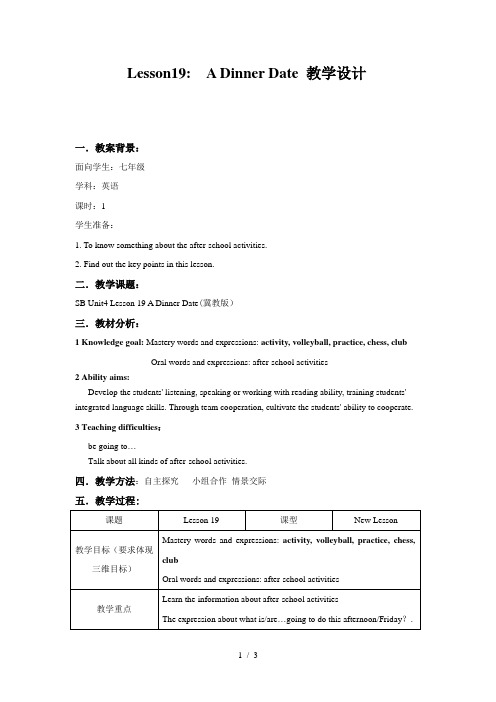
Step4. Read the text and check the answers. Then read the text again and repeat after it. After a while, ask some students to read the text loudly in roles.
Oral words and expressions:after-school activities
教学重点
Learn the information aboutafter-school activities
Theexpression about what is/are…going to do this afternoon/Friday?.
Let the students work in groups of three of four. After a while, present their answers to the class.
Step7. Come to “LET’S DO IT.”
Ask the students to talk in the class. Then they can give their presentation in dialogues or in composition. Encourage them to report one by one.
教学过程设计
Step1. Warming up:
1.Greetings and warm-up.
冀教版英语七年级下册Unit 4:Lesson 19 A Dinner Date. 教案设计

(3)Both与动词连用时,大多数放在系动词be之后,其它动词之前。
(4)Both可与and构成并列连词,连接两个性质相同并在句中作相同成分的并行结构。.
practice作不可数名词时,意为“练习;实习;实践;实施”等。
2. bothadj.&pron.两者(的)【针对性训练5,25】
(1) Both可作形容词、代词或副词用,意思是“两个”、“双方”、“两个都”。在句中可作主语、宾语或同位语.
(2)Both和both of后都可接复数名词,构成名词词组。但Both后的名词前可有定冠词、指示代词或物主代词作修饰限定,也可没有;both of后的名词前却一定要有定冠词、指示代词或物主代词作修饰限定。
19.I have math classeson Fridays.
math classes?
20.it ,what, it, today, day(连词成句)
?
Step7. Homework
1.Finish theexercises on Page51.
2.Preview Lesson20.
板书设计
Step3.合作探究
1.请听课文的录音第一遍,完成课本P51上第1部分的填空题。
2.请再听一遍,完成下列小题。
Today is Monday. Jim would like Steven to come over for dinner tomorrow. But he has a volleyball _______. Jim is going to the chess ____ on Wednesday. Steven usually ______ at the Old Age Home on Thursday. Steven has math classes on Friday. He is not ______ in math. This weekend, Jim is going to the countryside to plant trees. They’re _____ busy all week. But this evening, they are goingto have ______ to do.
冀教版七年级下册英语《A Dinner Date》After-School Activities

n.活动 n. 排球 n.&v. 练习 n. 国际象棋 n.俱乐部;社团 v. 自愿帮助 n.志愿者 n.宾戈游戏
adj.&
n.&
• 1. 在……方面做得好 • 2. 过来;来访 • 3. 今Байду номын сангаас星期几 • 4. 有益于,适于 • 5. 从……借……
do well in come over W be good for borrow...from...
nei 指“三者或三者以上都……”。如果表示“三者或三 all 者以上都不……”,用none。
Li Ming and Wang All my
Le
2.—W —___B_____. A.All C.None
B.Bo D.Ei
Le
句型透视
●1 Would you like 明天你愿意过来吃晚饭吗?
你愿意……吗? [探究] (1)“Would you like…?”意为“_________不__定__式”,表 示一种委婉的请求。would like后接名词、代词或________( 动名词/不定式)作宾语。句型“Would you like
_A_r_e_ you _g_o_i_n_g_ ____ ___ your 3.学生们准备明天干什么? -帮助农民摘苹果
-W are
going
are going
5.I’m no
词组“do well in…”意为“在……方面做得好;擅长于……”,in 之后接名词、动名词或代词。在意思和用法上相当于常用搭配“be good a
A.W
C.Would you like D.W
Uni
A Dinner Da
Af W
1. 能够掌握课标要求四会词汇: ac 2.
冀教版七年级英语下册 (A Dinner Date)After-School Activities

拓展 have nothing to do with...与……无关
Let's Do It !
1) What is Jim going to do this week?Listen and tick the pictures.
√
Jim:I'm going to the countryside with my dad. We are going to
plant trees.
Steven:Hmm...We’re both ❹ busy all week.
Jim:Well, what are you going to do this evening?
知识点 4 [高频] both/bəʊθ/ adj.& pron.二者(的)
考向一 both of...“(两者)都……”之后加名词或代词的复 数形式;both A and B“A和B两者都……”,A 和B通常为名词或代词的单数形式。both of...或 both A and B作主语时,谓语动词用复数形式。 eg:Both of them are doctors. 他们两人都是医生。 Both Lily and Lucy are doctors. 莉莉和露西两人都是医生。
going to do on...? A:I am going to… A:What are you going to do after school on Wednesday? B:I am going to see a movie with my friends.
What are you going to do on Thursday? A:I am going to play football with my brother.
冀教版七年级英语下册A Dinner DateAfter-School Activities 课件

Lesson 19 A Dinner Date
课前自主预习
1. 活动 [æk'tɪvətɪ] n. a_c_t_iv_i_t_y__
2.排球;排球运动 ['vɒlɪbɔːl] n.v_o_ll_e_y_b_a_ll_ 单
3.练习 ['præktɪs] n.&v. _p_ra_c_t_ic_e__ 词
They are both busy this week.
这X一i周’a他n们—(t两h个e)W都a很l忙le。d City
Both of the two girls are good at singing. 两个女孩都擅长唱歌。
All the students like the teacher very much.
线 3.今年我数学学得不太好。
I'm not __d_o_i_n_g__ _w__e_l_l___ ___in_____ math this year.
Lesson 19 A Dinner Date
4.整个星期我们两个都很忙。 句
We are _b_o__th____ busy __a_l_l____ _w__e_e_k___. 型
[探究] practice 作名词时,意为“练习”,是_不___可__数__(可数/不可数)名
词;作动词时,意为“练习”,其后接动词时只能接动名词,即practice doing sth.。
Lesson 19 A Dinner Date
活学活用
1.I often practice __C______ basketball after school.
Homework
1. Role play the text. 2. Make a new dialogue about your
冀教版七年级下册英语《A Dinner Date》After-School Activities课件

Music club 音乐俱乐部
Football practice 足球训练
Words and expressions
volleyball
chess practice
bingo volunteer
activity volleyball practice chess club volunteer bingo
1. To learn to make an invitation and talk about after-school activities
2. To learn the new words and expressions
Lead in
Let’s talk about some after-school activities.
……(方面)做得好 植树 照顾;照料 从……借来某物 去旅行 下周 在将来 非常喜欢某物
Presentation
Listen and fill in the blanks.
J: Would you like to _c_o_m__e_o_v_e_r__ for dinner tomorrow? S: Sorry, Jim. I can’t. I have __v_o_l_l_ey_b_a_l_l_
J: Maybe Friday? S: I have _m__a_th__ classes on Fridays. I’m not __g_o_i_ng
well in math this year. What are you _d_o_i_n_g__ to do this weekend? J: I’m ___g_o_in_gto the countryside with my dad. We are going to _p_la_n__t _ trees.
- 1、下载文档前请自行甄别文档内容的完整性,平台不提供额外的编辑、内容补充、找答案等附加服务。
- 2、"仅部分预览"的文档,不可在线预览部分如存在完整性等问题,可反馈申请退款(可完整预览的文档不适用该条件!)。
- 3、如文档侵犯您的权益,请联系客服反馈,我们会尽快为您处理(人工客服工作时间:9:00-18:30)。
It's reading time!
2. What is Steven going to do? Read the lesson and write down his schedule for the week.
Monday Tuesday
Language points
Would you like to come over for dinner tomorrow.
1)“would like” “愿意;想要”。=want 你想要点儿牛奶吗?
Would like some milk? --Yes, please./No, thanks.
How /what about playing football?
(1)相同点:两者都含有“都”的意思,放于be之后,行为动词之前
(2)不同点:both用于两者,而all用于三者或三者以上。
• ①—Did your parents climb Mount Tai last weekend?
—No, they ______ went to see a film.
When on Monday next week tomorrow evening tomorrow this afternoon
Language points
“be going to”该如何打算?
• be going to do sth. 打算做某事,强调按计划、安排 做某事
• 形式: 主语+be(not) going to +动词原形 + 其它.
A. all
B. both
C. either
D. every
• ②There are 11 players in this game. _____ of them are boys.
A. All
B. Both
C. Every
D. Each
Homework:
这个星期放学后你打算做什么 呢,请给自己列个计划吧。
• B: I’m going to see a movie with my friends. What are you going to do on…?
• A: I’m going to …
Who I
You She My friends They
What play chess see a movie watch TV have a party borrow some books
volleyball practice
ping-pong pract
play chess
see a movie with my friends
have dinner
Listen and answer
1. What is Jim going to do this week? Listen and tick the pictures on page 51.
He is going to have math classes.
4 Work in pairs. What are you going to
do after school this week? Make up a dialogue.
• Example:
• A: What are you going to do after school do well in Chinese and art. =I am good at Chinese and art.。
后跟名词,代词或者动词的-ing 形式 Eg: I like to read books,What about you? / How about you? 翻译: 去踢足球怎么样?
He is going to Jim’s home for dinner .
He is going to have a volleyball practice.
Wednesday
Nothing.
Thursday Friday
He is going to volunteer at the Old Age Home.
n.活动 n. 排球 n.&v. 练习 n. 国际象棋 n.俱乐部;社团 v. 自愿帮助 n.志愿者 n.宾戈游戏 adj.&pron. 都 (二者的) n.&pron. 无事;无物
Let's look at some pictures to know some after-school activities.
2) come over意为“过来;来访” 今天下午Jim要来咱们家。
Jim will come over to our house this afternoon.
I’m not doing well in math this year.
词组“do well in ...”意为“擅长于……”, in之 后接名词、动名词或代词。相当于常用搭 配“be good at ...”,
Unit4 After-School Activities
A Dinner Date
Presentation
• activity • volleyball • practice • chess • club • volunteer
• bingo • both • nothing
Learn some new words
